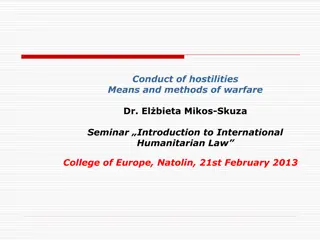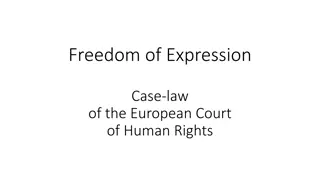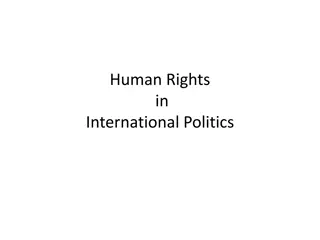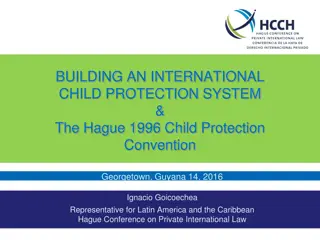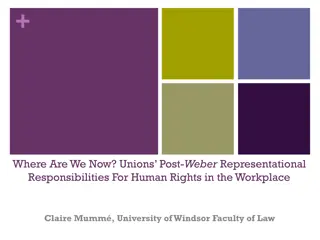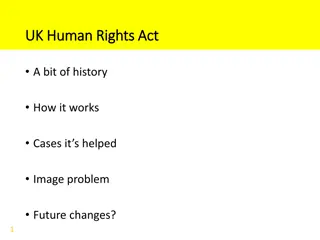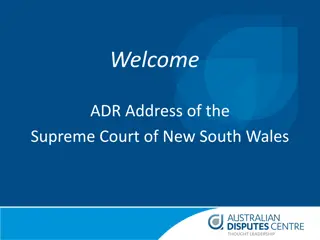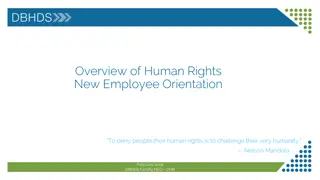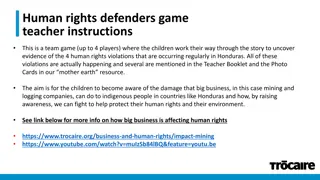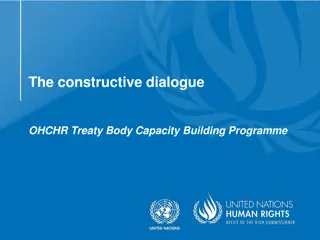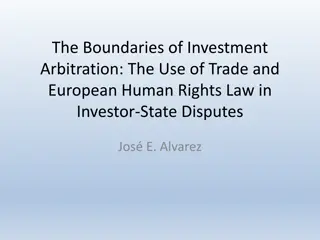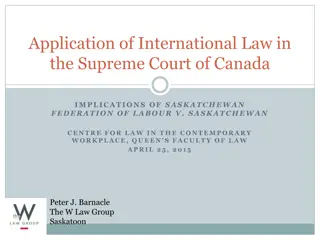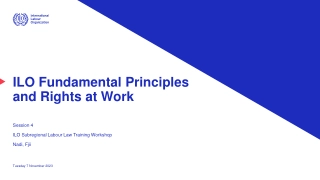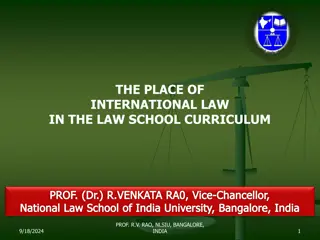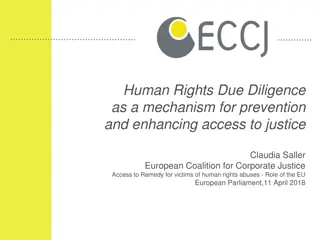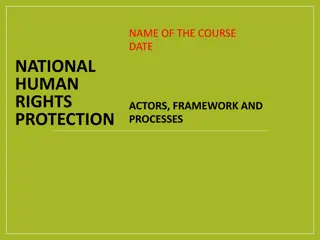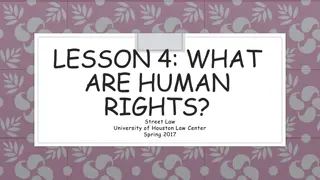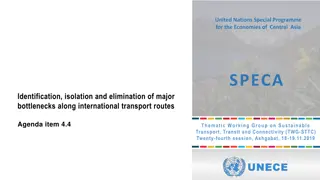International Human Rights in Occupation Law: Principles and Conventions
Explore the application of international human rights in the context of occupation law, examining key principles like territorial authority, restoration of public order, protection of individuals, and essential provisions for fulfilling obligations under international conventions.
Uploaded on Sep 13, 2024 | 0 Views
Download Presentation

Please find below an Image/Link to download the presentation.
The content on the website is provided AS IS for your information and personal use only. It may not be sold, licensed, or shared on other websites without obtaining consent from the author. Download presentation by click this link. If you encounter any issues during the download, it is possible that the publisher has removed the file from their server.
E N D
Presentation Transcript
The Application of International Human Rights in Occupation Professor Aeyal Gross
Law of Occupation Hague Art 42: Territory is considered occupied when it is actually placed under the authority of the hostile army. The occupation extends only to the territory where such authority has been established and can be exercised.
Law of Occupation Hague Article 43: The authority of the legitimate power having in fact passed into the hands of the occupant, the latter shall take all the measures in his power to restore, and ensure, as far as possible, public order and safety, while respecting, unless absolutely prevented, the laws in force in the country.
Law of Occupation Fourth Geneva Convention - Article 2: In addition to the provisions which shall be implemented in peace- time, the present Convention shall apply to all cases of declared war or of any other armed conflict which may arise between two or more of the High Contracting Parties, even if the state of war is not recognized by one of them. The Convention shall also apply to all cases of partial or total occupation of the territory of a High Contracting Party, even if the said occupation meets with no armed resistance.
Law of Occupation Fourth Geneva Convention, Article 4: Persons protected by the Convention are those who, at a given moment and in any manner whatsoever, find themselves, in case of a conflict or occupation, in the hands of a Party to the conflict or Occupying Power of which they are not nationals.
Law of Occupation Fourth Geneva Convention Article 64: The Occupying Power may, however, subject the population of the occupied territory to provisions which are essential to enable the Occupying Power to fulfill its obligations under the present Convention
Law Of Occupation Basic Principles Ben-Naftali, Gross & Michaeli (2006): Occupation does not confer sovereignty and title. Under self-determination: with population under occupation Occupying power entrusted with management of public order and civil life, people under occupation beneficiaries of trust Occupation is temporary (not permanent/indefinite)
On the way to application of human rights in occupation . Extra territorial application of human rights Co-application of IHL/IHRL (Meron: The Humanization of Humanitarian law ; Teitel Humanity s Law ).
International Court of Justice Nuclear Weapons (1996) Construction of A Wall (2004) Armed Activities (DRC v. Uganda) (2005)
IHL/IHRL Divergence/Convergence? (Unity/Fragmentation?) International Humanitarian Law Laws of War Exception protected persons International Human Rights Law Laws of Peace Norm Universality State-citizens
AP1, article 72 The provisions of this Section are additional to the rules concerning humanitarian protection of civilians contained in the Fourth Convention, , as well as to other applicable rules of international law relating to the protection of fundamental human rights during international armed conflict.
Israeli (& US) arguments against co- application IHL applies (mutual exclusivity of IHL/IHRL) Jurisdiction clauses interpreted in restrictive manner Lack of effective control in some of the territories. UN Human Rights Treaty bodies reject Israeli position
Construction of A Wall (2004) Para 106: the protection offered by human rights conventions does not cease in case of armed conflict, save through the effect of provisions for derogation Para 111: the ICCPR is applicable in respect of acts done by a State in exercise of its jurisdiction outside its own territory . Para 112: In the exercise of the powers bound by the provisions of the ICESCR
Construction of A Wall (2004) (para. 106) As regards the relationship between international humanitarian law and human rights law, there are thus three possible situations: some rights may be exclusively matters of international humanitarian law; others may be exclusively matters of human rights law; yet others may be matters of both these branches of international law. In order to answer the question put to it, the Court will have to take into consideration both these branches of international law, namely human rights law and, as lex specialis, international humanitarian law
Armed Activities (2005) (para. 178) Uganda was the occupying power As such it was under an obligation according to Article 43 to secure respect for the applicable rules of international human rights law and international humanitarian law
Pro: Ben Naftali & Shany Universality Human rights can redefine obligations, serve as yardstick, encourage court to take more active approach, advance welfare of people and legal culture of compliance. Fills normative gaps/interpretation Allows international monitoring Welfare of people/ compliance
Con: Dennis Unrealistic to expect occupying forces in short-term occupation to fulfill all obligations The need to respect existing laws Core human rights obligations not intended to apply
Modalities (Ben-Naftali & Shany) Direct conflict ( lex specialis ) Unregulated by either (complementary) IHL influences interpretation if IHRL IHRL influences interpretation if IHL
European Court of Human Rights: (Cyprus) Loizidou v. Turkey (1996) Cyprus v. Turkey (2001) Strati, Vrahimi, Papi (2009) Demopoulous v. Turkey (2010)
Loizidou v. Turkey (1995/1996) Responsibility of contracting party may arise when as consequence of military action it exercises effective control of an area outside its national territory; obligation to secure the rights derives from the fact of such control, exercised directly or through subordinate local administration; occupation of northern Cyprus by Turkish troops - imputable to Turkey (jurisdiction) (preliminary, para 62- 64). (Merits para 52-54).
European Court of Human Rights (Iraq) Al-Saadon v UK (2010) Al-Jedda v UK (2011) Al-Skieni v UK (2011)
Al-Skieni v. UK (2011) (para 133-142) Extraterritorial jurisdiction/application of ECHR in: State agent authority and control: Effective control over an area: State exercises effective control of an area outside its national territory direct or indirect control espace juridique
IHL vs IHRL : no conceptual difference or? IHL Special category of protected persons Proportionality is damage to civilians proportional to the legitimate military objective Vertical balancing Situation of occupation is baseline Non-derogable IHRL Universal all persons equal (abstract) Proportionality - limits on rights in the name of public interest or the rights of others Vertical and horizontal balancing (and merger of rights/security) Democracy is baseline Can fill gaps
Israel HCJ Ma arab (2003) Mara be (2005) Public Committee Against Torture (2006) Hass (2004) Bethlehem (2005) Nasser (Dir Kadis) (2007)
Cyprus (ECHR) Loizidou v. Turkey (1996) Cyprus v. Turkey (2001) Strati, Vrahimi, Papi (2009) Demopoulous v. Turkey (2010) (especially paragaphs 10, 96, 111-117)
Models Lubell (2012): Contextual approach . Problem in Al-Skieni all or nothing approach . Occupation triggers applicability of full range, but factual and legal contexts matters (applicability v mode of application) respect, protect and fulfill (negative v positive? but not as only benchmark) Social rights- core obligations v long-term matters?
Issues Right to life? (Human rights more restrictive than IHL) Land/Property (IHL more restrictive the human rights) Detention (Human rights more restrictive than IHL)
Transformative Occupation and IHRL? Lubell: changes that are in line with objectives of the law of occupation under Article 43, , designed to benefits the rights of the inhabitants should be allowed. Roberts (2006): conservationist v transformative Article 43: what s legitimate power ? Are the existing laws satisfactory? What s unless absolutely prevented ?
Transformative Occupation and IHRL? Roberts: exercise of human rights and implementation of transformative policies approved by Security Council (today would have been included in Art 64). [and evolving custom]. Res 1483 (2003): working to restore and establish national and local institutions for representative government promoting the protection of human rights legal and judicial reform.
Transformative Occupation and IHRL? CPA controversial measures in Iraq: De-Ba athification Dissolution of Entitites Foreign Investments allowing foreign investors to own Iraqi companies without being required to reinvest profits into the country economic transformation
Roberts: Special relevance When occupation is denied If there is indigenous government If human rights incorporated into the domestic law If some are not considered protected persons Gap filling (especially in long term occupations which approximate peace times )
Roberts: Special relevance When there are human rights procedures (e.g. ECHR) Non derogable rights Legal basis for transformation. (Art 1 of ICCPR and self-determination)
Transformative Occupation and IHRL? Roberts: exercise of human rights and implementation of transformative policies approved by Security Council (today would have been included in Art 64). [and evolving custom ]. [Problems: other bodies? Legalized hegemony Gerry Simpson; self-interest? New colonialism?].









